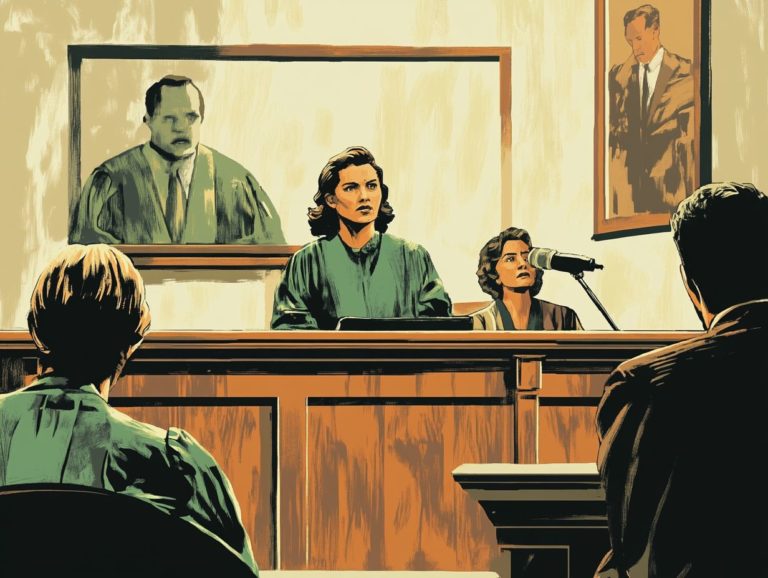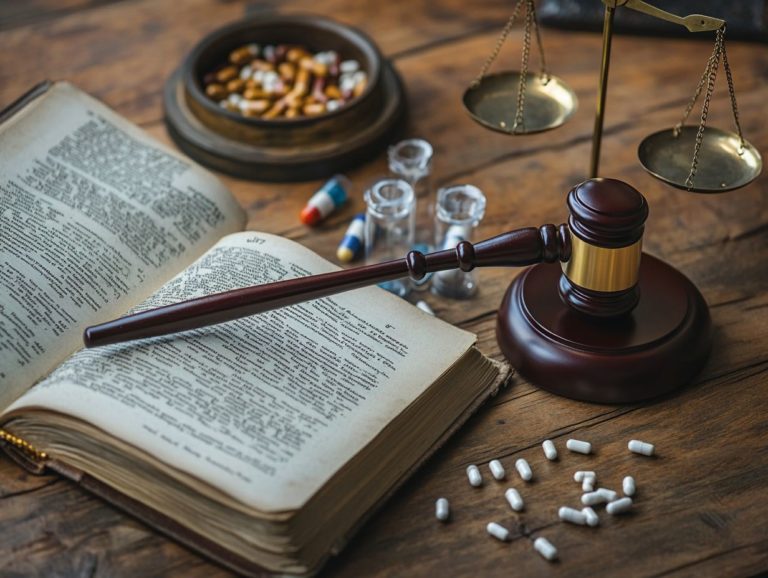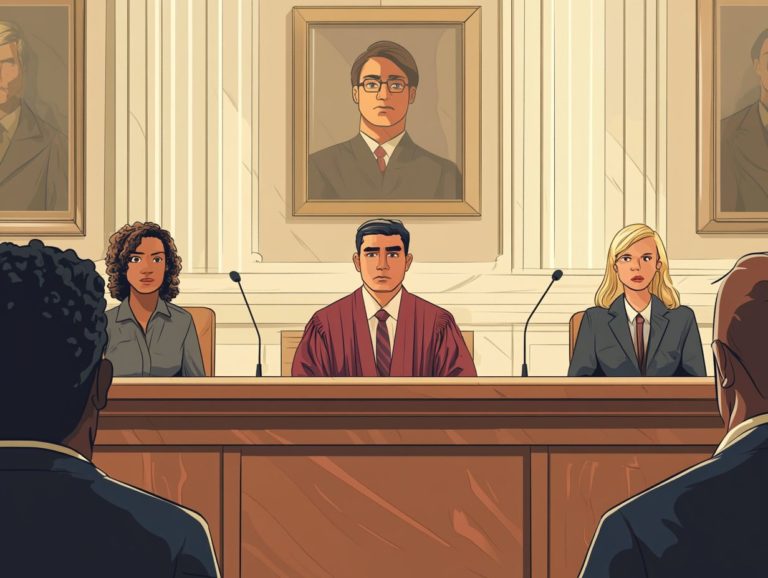Understanding the Legal Process for Drug Crimes
Drug crimes cover a broad spectrum of offenses, each carrying substantial implications for both individuals and society at large.
This overview delves into their definitions and impacts, navigating the complex legal journey from arrest to sentencing. You ll explore potential defenses and strategies for countering charges, as well as the factors that can sway sentencing decisions.
We will also explore viable alternatives such as diversion programs and rehabilitation.
Engage with us to gain a deeper understanding of the challenges and solutions surrounding drug-related offenses.
Contents
- Key Takeaways:
- The Legal Process for Drug Crimes
- Possible Defenses for Drug Crimes
- Sentencing for Drug Crimes
- Alternative Sentencing Options
- Frequently Asked Questions
- What are drug crimes?
- Why is it important to understand the legal process for drug crimes?
- What is the first step in the legal process for drug crimes?
- What happens after an arrest for a drug crime?
- What are the possible penalties for a drug crime conviction?
- Do I need a lawyer if I am facing drug crime charges?
Key Takeaways:
- Drug crimes significantly impact individuals and society.
- The legal process involves multiple steps, each crucial for navigating your case.
- Knowing possible defenses and sentencing alternatives can improve outcomes.

Drug crimes encompass a broad spectrum of illegal activities involving controlled substances, ranging from possessing small amounts of drugs to more severe offenses like drug trafficking and manufacturing.
In jurisdictions such as Platte County, the legal landscape can shift dramatically based on how a substance is classified, whether as a Schedule I or Schedule II drug.
When individuals violate drug laws, they not only face criminal charges but also contribute to significant public health challenges, such as addiction treatment and rehabilitation programs, which are critical in addressing the societal repercussions of drug-related offenses.
Defining Drug Crimes and Their Impact
Defining drug crimes requires understanding the wide array of illegal activities involving controlled substances. These offenses can range from possession to trafficking, each carrying serious legal consequences and societal ramifications.
These acts fall into several key categories, including manufacturing, distribution, and possession, all governed by various statutes like the Controlled Substances Act. The implications of these offenses extend far beyond the courtroom, often resulting in significant public health challenges that underscore the urgent need for effective addiction treatment programs.
If you or someone you know is facing drug charges, navigating the complexities of the legal system with a strong criminal defense is essential to mitigate the repercussions of these actions. By taking a holistic approach, society can gain a clearer understanding of the impacts of drug-related crimes and explore meaningful pathways for rehabilitation.
The Legal Process for Drug Crimes
The legal journey for drug crimes begins with police procedures that can profoundly influence the outcome of a case.
For defendants confronting charges that range from simple possession to serious trafficking offenses, whether in federal or state court or even within specialized drug court systems securing skilled legal representation becomes essential.
Steps from Arrest to Sentencing

- Arrest
- Initial hearing
- Plea negotiations
- Sentencing
The journey from arrest to sentencing in drug crime cases encompasses several critical steps. Once you’re arrested, the process typically begins with an initial hearing, where charges are formally laid out, and you have the opportunity to enter a plea. At this junction, seeking legal representation is essential; an experienced attorney can skillfully navigate plea negotiations on your behalf and advocate for more favorable outcomes.
The decisions made by prosecutors depend on various factors, such as your prior criminal history, the quantity and type of drugs involved, and local legal guidelines.
Sentencing guidelines can vary significantly based on whether the charge involves possession, trafficking, or manufacturing. These distinctions affect not only the length of potential incarceration but also your eligibility for rehabilitation programs.
Stay informed and empowered as you navigate the complexities of drug crime charges.
Understanding drug crime laws is crucial, and seeking legal assistance when needed can make a significant difference.
Possible Defenses for Drug Crimes
Possible defenses for drug crimes offer a range of strategies that you, as a defense attorney, might consider. These could include:
- Challenging the legality of the search that resulted in drug possession charges.
- Questioning the credibility of eyewitness testimony.
It is essential to meticulously analyze the specifics of each case to build a robust defense.
Strategies for Fighting Charges
Strategies for fighting drug charges often involve plea negotiations and evidence suppression tactics. These can significantly influence the outcome of your case.
Navigating this terrain with expert guidance is crucial for your future! A proficient legal representative will assess the strengths and weaknesses of the prosecution s case. They will pinpoint vulnerabilities that you can exploit during negotiations.
By gathering critical evidence, challenging the legality of searches and seizures, or presenting alternative narratives, you can strengthen your position.
These deals can result in reduced charges or alternative sentencing options, which can make a substantial difference in your future. The strategic suppression of evidence not only undermines the prosecution’s case but also opens doors for potential dismissals.
This highlights the essential role that comprehensive legal support plays in navigating the complexities of drug crime defense.
Sentencing for Drug Crimes
Sentencing for drug crimes presents a multifaceted landscape shaped by numerous factors. These include the type of drug involved, the weight of the substance, and whether the charges are classified as felonies or misdemeanors.
These distinctions can vary significantly between federal and state court systems, adding layers of complexity to the process.
Factors Influencing Sentencing
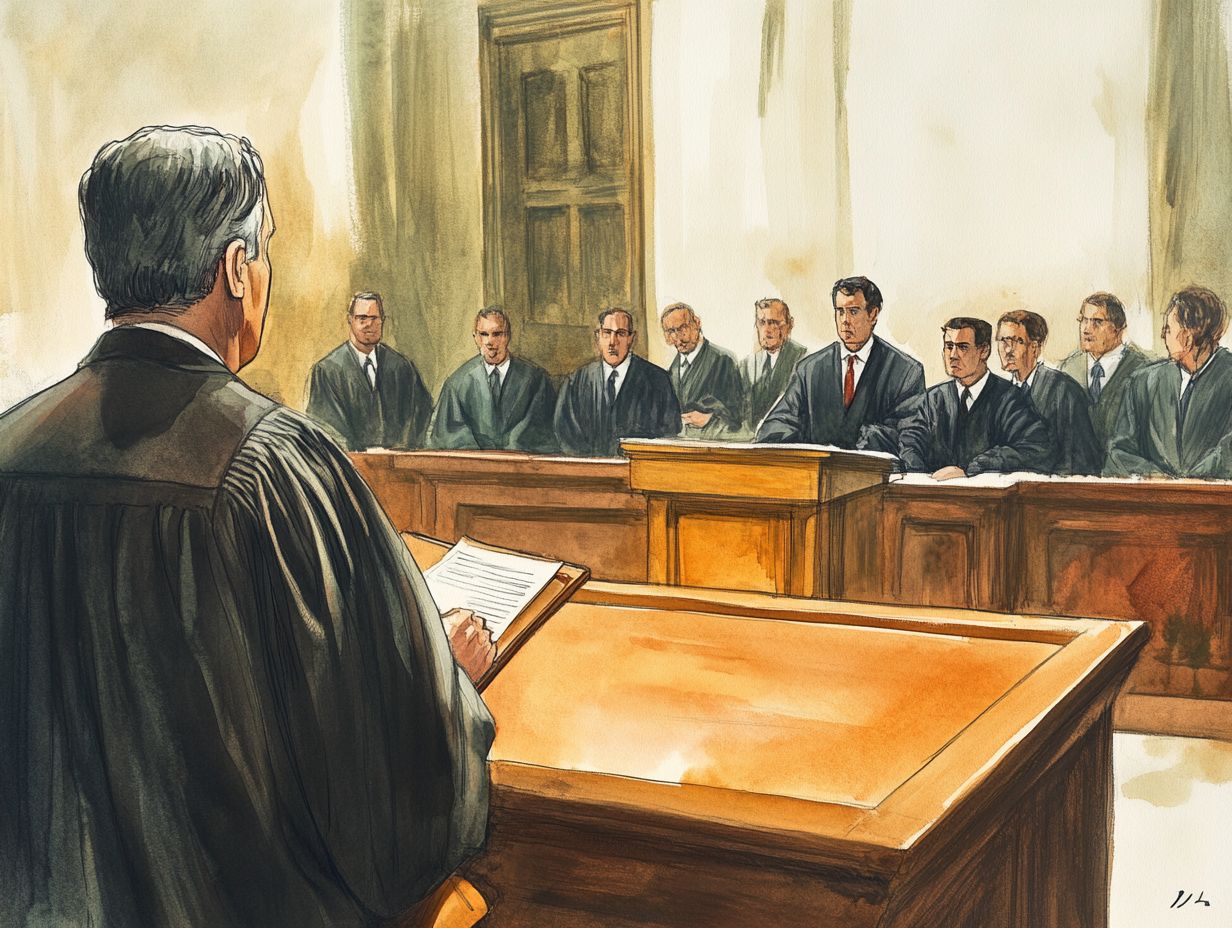
Factors influencing sentencing in drug-related offenses often hinge on the purity of the drug, your prior criminal history, and your willingness to engage in rehabilitation programs. All of these can sway a judge s judgment significantly.
When judges evaluate your case, they scrutinize the purity of the substance involved and your past encounters with the law. If you have a history of repeated offenses, you might face stricter penalties.
However, as a first-time offender, demonstrating genuine remorse and a commitment to change could lead to a more lenient approach.
Courts often take the potential for rehabilitation seriously. If you actively participate in treatment programs, you can persuade a judge to consider alternatives to traditional sentencing, such as drug courts or community service.
This ultimately offers you a chance for recovery rather than confinement.
Alternative Sentencing Options
Alternative sentencing options for drug offenses, including diversion programs and drug rehabilitation, give you a chance to tackle the underlying issues of addiction.
By pursuing these alternatives, you may be able to sidestep the severe penalties typically tied to traditional sentencing guidelines. This approach addresses the root of the problem and opens the door to a more constructive path forward.
Diversion Programs and Rehabilitation
Diversion programs and rehabilitation are essential in the battle against drug-related offenses. They offer structured pathways for addiction treatment that address the public health crisis related to illegal drug use.
These initiatives provide you with the support needed to overcome substance abuse. They present a thoughtful alternative to traditional punitive measures that often overlook the root causes of addiction.
By emphasizing treatment over incarceration, these programs promote a holistic approach to recovery. This allows you to acquire essential skills and access ongoing support systems.
The integration of therapy, counseling, and community resources is vital for giving you the power to reintegrate successfully into society.
Ultimately, such efforts can lead to a significant reduction in the tendency to re-offend, contributing to safer neighborhoods by minimizing the prevalence of drug-related crimes.
Frequently Asked Questions
What are drug crimes?
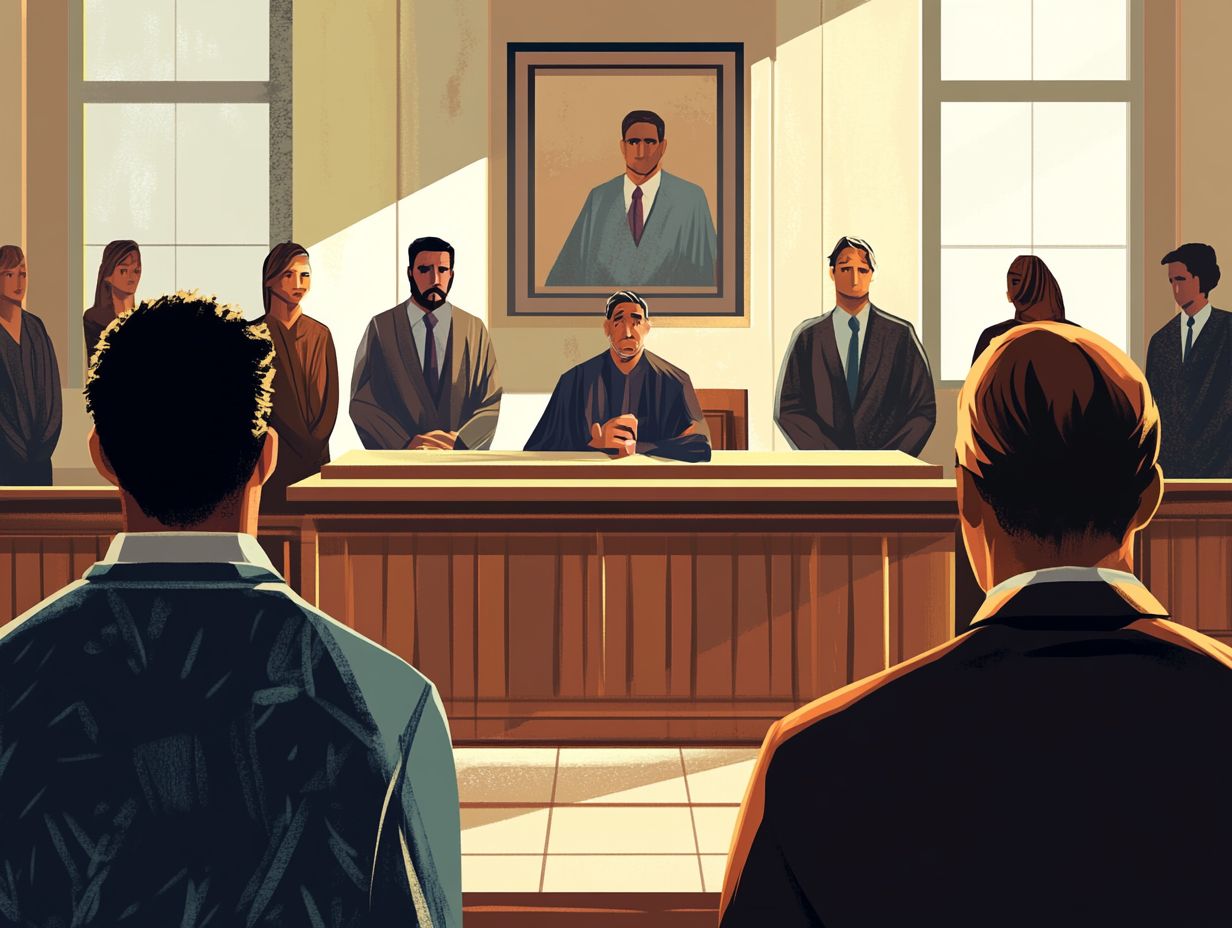
Drug crimes are offenses related to illegal drugs. This includes possession, manufacturing, sale, or distribution of substances like cocaine, heroin, methamphetamine, marijuana, and even prescription drugs.
Why is it important to understand the legal process for drug crimes?
Knowing the legal process can help you navigate the criminal justice system. It also empowers you to make informed decisions about your defense and understand the potential consequences.
What is the first step in the legal process for drug crimes?
The process typically begins with an arrest. This is when law enforcement takes a person into custody for a drug-related offense.
What happens after an arrest for a drug crime?
Next, a bail hearing usually occurs. A judge will decide if the accused can be released before trial, possibly requiring conditions like regular check-ins or abstaining from drugs.
What are the possible penalties for a drug crime conviction?
Penalties can vary widely based on the offense and drug type. They range from fines and probation to long prison sentences, with treatment programs sometimes offered as alternatives to jail time.
Do I need a lawyer if I am facing drug crime charges?
It’s strongly advised to hire a criminal defense lawyer if facing drug charges. A lawyer will clarify the charges, build a solid defense, and protect your rights during the legal process.


